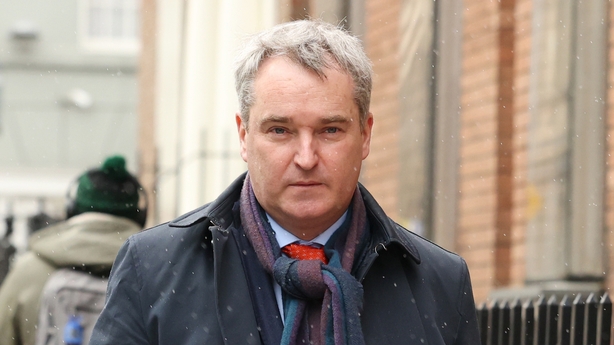Public sector workers have called for increased starting salaries in the civil and public service amid claims that pay for new entrants is far too low.
Motions on the issue have been passed at the biennial conference of Fórsa, the country's largest public sector trade union.
More than 700 delegates have gathered in Killarney, Co Kerry for the event which began last night and will run until tomorrow.
Around 200 motions are being debated on topics including pay, remote working, sick leave, pensions, artificial intelligence and the rise of the far right.
In his address to the conference, Fórsa General Secretary Kevin Callinan called for a shift in how the government engages with unions.

"When a relationship is so flawed and unequal, the best thing you can do is leave. I'm not interested in being part of it anymore," Mr Callinan said.
He called for a move away from short termism to a more long-term vision for the country and warned that the next public sector pay talks, in two years time, will be tougher than ever.
In his address, Mr Callinan described the Secretary General of the Department of Health Robert Watt as the "captain of the austerity ship" and accused him of trying to "gaslight" health workers by suggesting they were in some way responsible for long waiting lists.
In response, the Department of Health said at no time has the Secretary General sought to blame health care workers for the challenges faced by the health service.
A spokesperson said that last week Mr Watt highlighted the contributions being made by the Enhanced Community Care Programme and the Waiting List Action Plan in positively impacting waiting lists in the country’s health service, which have fallen for the last two years.
"Mr Watt also outlined the increased levels of activity being delivered by staff across the health service, and particularly in hospital Emergency Departments, in spite of the significant increases in demand with which they are faced," the spokesperson said.
Mr Watt has been Secretary General of the Department of Health at a time of unprecedented expansion of our health workforce," they said.
"It is planned to recruit over 2,200 extra staff in 2024," the Department said.
Pay
On the issue of pay, a series of motions called for increases in the starting salaries of new entrants in the civil and public service.
Áine Bullock is a civil servant and a Fórsa delegate.
"The issue of entry level pay has really agitated members and I can see why it is something that comes up more and more at conference," Ms Bullock said.
"I think a civil service career is really valuable, I am really proud to be a civil servant and I don't want to miss out on the opportunity simply because frankly, they can't pay their rent at the current pay levels," she added.

A new public sector pay deal was agreed in January which provides for pay increases of 10.25% over a two-and-a-half-year period.
The deal includes a local bargaining mechanism to allow individual grades, groups and categories of public servants to have specific issues addressed.
A number of motions at the Fórsa conference call for this mechanism to be used to improve low pay for new entrants.
Delegates are also discussing shortening pay scales, the living wage and overtime. One motion calls for the introduction of an urban living allowance.
Abuse directed at staff
Concerns were highlighted at the conference about the levels of abuse being directed at library workers and local authority staff.
Róisín Cronin is a local authority worker and a Fórsa delegate. She said a recent survey carried out by the union showed that many staff members encounter abusive behaviour.
"The report indicated that eight in ten people said that they felt they had experienced aggression," Ms Cronin said.
"I think as local authority workers, we are engaging with people who are trying to access what are limited public services."
"So if someone is coming in for housing for instance, and they're in a vulnerable position, they might be in dire need and emotions are going to be heightened."
"Our members are trying to engage and deal with people coming into them in very difficult circumstances," she added.
Sick leave
A number of motions focus on annual leave and sick leave arrangements.
Delegates will hear calls for greater supports in the area of menstrual health, improved domestic violence leave entitlements and enhanced supports for people going through a separation or a divorce.
There are also motions calling for leave entitlements linked to fertility treatment, surrogacy, miscarriage and abortion.
"This conference calls on Fórsa to engage with the government to implement legislation for abortion leave. No woman should be forced to take ordinary sick leave or unpaid leave and be at a financial loss when accessing this healthcare," one motion states.
Remote working
Motions on remote working relate to the right to disconnect, blended working expenses as well as calls to safeguard people's work-life balance.
One motion raises concerns over 'insidious tools' and tracking devices used by companies to monitor remote workers.
"This conference calls on the incoming National Executive Committee to ensure that our employer(s) should never be allowed conduct any remote monitoring by installing such software or tools," according to the motion.
Proposals on artificial intelligence call on the union to conduct research on how the technology will impact the workplace.
One motion suggests that Fórsa should seek a policy of de-automation of Government services so as to protect service provision to the general public.
On international matters, delegates will reaffirm their support for the people of Ukraine, condemn the violence in the Middle East, and will hear calls to boycott and sanction Israel.
Guest speakers
Dr Jilan Wahba Abdalmajid, Palestinian Ambassador to Ireland, is among the guest speakers at the conference.
Delegates will also hear from a range of leading trade unionists including Esther Lynch, General Secretary of the European Trade Union Confederation, Owen Reidy, General Secretary, Irish Congress of Trade Unions (ICTU) and Phil Ní Shéaghdha, General Secretary of the Irish Nurses and Midwives' Organisation (INMO).






